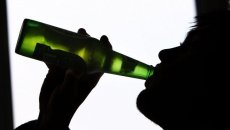Scientists have discovered the gene for drunkenness
Last reviewed: 20.11.2021

All iLive content is medically reviewed or fact checked to ensure as much factual accuracy as possible.
We have strict sourcing guidelines and only link to reputable media sites, academic research institutions and, whenever possible, medically peer reviewed studies. Note that the numbers in parentheses ([1], [2], etc.) are clickable links to these studies.
If you feel that any of our content is inaccurate, out-of-date, or otherwise questionable, please select it and press Ctrl + Enter.

British scientists from King's College found a gene responsible for teenage alcoholism.
The mutated gene RASGRF2 makes the brain more susceptible to addiction and awakens a penchant for alcohol dependence.

According to scientists, alcoholic beverages, as well as drugs, provoke the secretion of the hormone of pleasure and pleasure - dopamine. During the consumption of alcohol, the gene RASGRF2 takes an active part in the process of dopamine production, which is fraught with serious problems for those who drink.
"If a person has this gene in stock, it affects how they perceive alcohol. In this case, the sensations of pleasure and reward will be expressed much more ", - commented the lead author of the study, Professor Günter Schumann.
That is, what makes us happier and makes us feel joy, our body perceives as something useful, in particular, such a pseudo-useful product in this case is alcohol.
Scientists are worried that in recent years, the rate of teenage drinking is gaining momentum. In 1994, adolescents used an average of six units of alcohol per week, and in 2007 the weekly number increased to 13 units. Experts take a glass of wine for a unit of alcohol.
Adolescent alcoholism leads to health problems and the development of antisocial behavior.
Experts conducted a study in mice. Those rodents that lacked the RASGRF2 gene reacted to alcohol not as pronounced as those who had its variations. This is because the absence of RASGRF2 weakened the work of neurons responsible for dopamine production and located in the ventral tegmental region of the brain.
Also, 663 14-year-old boys participated in the experiment, who had no health problems and who either did not have any acquaintance with alcoholic beverages, or still had, but in very small doses. At the age of 16 the same adolescent boys were examined again. It turned out that many began to drink alcohol more often and in large quantities. In those with RASGRF-2 gene detected, as well as in mice, the craving for alcohol was more pronounced.

 [
[